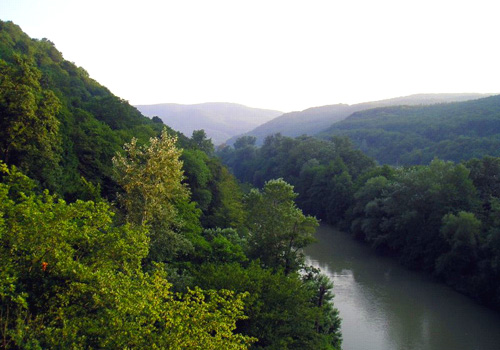Core Classes
 |
| A Gorge in the Dragonwall |
Bards: Bards fit very well in an Urban campaign centered around Phoenicia. Singers, dancers, musicians, acrobats, and orators that pontificate on the local podiums count as bards. Bards with psionic talent (usually wild talent) have been known to incorporate psionics into their performances. Those with PK or Telepathic abilities are the more common. Bards with PK ability often use levitation of objects, while bards with Telepathic ability are known as mentalists. Bards with Clairsentience abilities are known as street psychics. People who are martial art performers, however, are of an entirely different class.
Clerics: Clerics are pretty respected among society. Clerics of Zeus have some political clout and often have to compete with the Brahmins. You can work with the GM to choose a deity that suits your needs. Note that Buddhist monks are considered to be of the Cleric class, not the Monk class.
Druids: Druids are priests or shamans that respect nature. True druids are very rare and most orcs are of the Shaman class. The few druids that exist are among human barbarian tribes and the few high elves that come to live in the city. There are no druids among the Desert Elves, who have more monotheistic leanings (unless you have an interesting backstory). Druids aren't often found in Phoenicia, and therefore the least common.
 |
| Castor and Pollux |
Fighters: Fighters can come from any walk of life in Phoenicia. Phoenicia has several orders of chivalry you may want to join. There is also the Guild of Swords, or the Order of Strength. Many fighters get their start in the Arenas; others join the with the army.
Paladins: Phoenicia has several orders of Chivalry you might find appealing, including the Order of Achilles or the Society of Rama. The two orders have a friendly rivalry. Also, see the discussion in the Cleric entry above about choosing a god to serve your needs.
Rogues: There is a whole society of thieves devoted to Hermes (Hermes' Sons). Remember, though, thief is but one option. There is the espionage route -- because Phoenicia has an entire agency dedicated to espionage called Secret Intelligence. Orc rogues belong to the orc Society of Serpents (which means that they are more sophisticated than they let on). Some rogues act as merchants and artisans, while others are rakes. Not surprisingly, this is due to their skillfulness. Thus, as far as hero classed people go, this class is the most represented in the city.
Sorcerers: Not surprisingly, in a psionic city, Sorcerers are rare but more common than wizards (or their variants). The Bloodlines that are the most common are Abberant, Abyssal, Arcane, Destined, Dreamborn, Elemental, and Infernal.
Wizards: Wizards take a scholarly approach to magic. They tend to look at magic as a science. However, in a city of Psionics, they are extremely rare. So rare that if someone saw a wizard working magic, they would most likely confuse him with a psion. However, people confuse the Wizard with their more malefic counterpart -- the Warlock. Wizards accused of working Dark, Fel Magic have little hope of proving their innocence but are commonly executed by drinking hemlock poison. Wizards, whether apprentice or master, tend to hide their art.
Psionic Classes
Psion: Psions are the most common of the psionic classes. They are typically learned and have learned psionics according to one of three methods: the Will and the Way, the Chakra Method, and the Law of Cause and Effect method.
Psychic Warrior: Like the fighter and the Paladin, there are some chivalristic orders that one can join over time. Psychic Warriors can also start in the arenas.
Soulknives: Soulknives typically train by using their psychic energy to create a mindblade. There are many options for soulknives, however. The same chivalristic orders and espionage are good options for Soulknives; also many soulknives act as paladins for their people. A good number of soulknives operate in the City Watch. They are the rarest of the psionic classes.
Wilders: Typically untrained, wilders have uncontrolled psionic potential. Without the formal training, their powers are connected to their emotions. Wilders are found among the poor and among those who can't demonstrate self control. They are the second most common of the psionic classes.
No comments:
Post a Comment